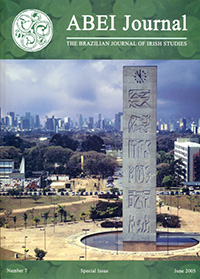The Concepts of Time, Memory and Identity in Beckett’s Essay on Proust
DOI:
https://doi.org/10.37389/abei.v7i1.184202Palavras-chave:
Tempo, Memória, Identidade, Samuel Beckett, Marcel ProustResumo
Beckett’s essay on Proust, in which he examines the philosophical concepts of time, memory and identity, has exerted enormous influence on modernist and post-modernist writers, who have consciously adapted and re- synthesized the ideas he developed not only in the essay but also in his plays in general. Although he was not the creator of the “memory play”, Beckett has helped to establish the new genre by reflecting upon philosophical problems and adapting psychological phenomena for dramatic theory, besides extending the limits of the dramatic. His theatrical experiments have been considered as examples of the strictest form of the “memory play”.
Referências
Arnold, Armin, ed. The Symbolic Meaning: the Uncollected Versions of Studies in Classic Ameri-
can Literature. London: Centaur, 1962.
Baker, James R.; Thomas Staley F., eds. James Joyce’s Dubliners: A Critical Handbook. Belmont:
Wadsworth, 1969.
Beckett, Samuel. Bram van Velde. New York: Grove Press, 1960.
___. Dante...Bruno, Vico...Joyce. In: Beckett, Samuel et alii. Our Exagmination Round His
Factification for Incamination of Work in Progress. London: Faber, 1961.
___. Krapp’s Last Tape & Embers. London: Faber, 1959.
___. Proust & Three Dialogues. London: Calder & Boyars, 1970.
___. Proust. Trad. Arthur Nestrovski. São Paulo: Cosac & Naify, 2003.
___. Waiting for Godot. London: Faber, 1979.
Bergson, Henri. The Creative Mind: an Introduction to Metaphysics. New York: Citadel Press,
Browne, E. Martin, ed. Tennessee Williams: Sweet Bird of Youth, A Streetcar Named Desire, The
Glass Menagerie. Harmondsworth: Penguin, 1980.
Camati, Anna Stegh. The Seriocomic Theatre of Tom Stoppard: Parodic Theatricality in Travesties.
São Paulo, 1987. 228 p. Ph.D. Dissertation, University of São Paulo.
Colby, Douglas. As the Curtain Rises: on Contemporary British Drama. London: Associated Uni-
versity Presses, 1978.
Eliot, T. S. Selected Essays. London: Faber, 1951.
Esslin, Martin. The Theatre of the Absurd. Harmondsworth: Penguin, 1980.
Groff, Edward. “Point of View in Modern Drama”. Modern Drama, 2 (1959-60): 268-82.
Parker, R.B. Twentieth Century Interpretations of The Glass Menagerie: a Collection of Critical
Essays. New Jersey: Prentice Hall, 1983.
Pinter, Harold. Old Times. New York: Grove Press, 1971.
Postlewait, Thomas. Self-Performing Voices: Mind, Memory and Time in Beckett’s Drama. Twen-
tieth Century Literature, 24 (1978): 473-91.
Stoppard, Tom. Travesties. London: Faber, 1975.
Downloads
Publicado
Edição
Seção
Licença
Copyright (c) 2005 Anna Stegh Camati

Este trabalho está licenciado sob uma licença Creative Commons Attribution-NonCommercial 4.0 International License.


